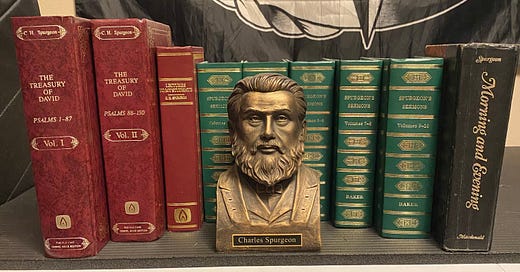I haven’t read much Spurgeon lately. I spent the last half of college and the following years using Morning & Evening as a daily devotional, meandered my way through his sermons, and utilized his Treasury of David for a few sermons & papers of my own. One of the most striking things about him was how he could speak the Gospel so plainly, while still remaining pointed at the culture & world around him.
An English preacher, he had a burning hatred for American slavery. He wrote and preached against it, especially when he was invited to preach in the north. Preachers in the American South decried him as a heretic, an anti-Christ, a pharisee, vulgar, and every name but a Child of God. He was so hated in the South that when he came stateside, newspapers featured offensive cartoons of him hanging from nooses. One preacher, it is said, put up a monetary reward for Spurgeon’s capture and kidnapping to the south, where he could be lynched. Anti-Spurgeon book burnings took place all across the South.
At a time when southern preachers (many who owned slaves themselves) were doing everything they could to defend slavery, and very few preachers in the north were willing to speak up against slavery, Spurgeon’s courage inspired me. It still does.
Spurgeon knew that the Gospel of Jesus applies to all of life. Our personal salvation and how we live out of that, which includes our political lives. He also knew that God addresses Israel as a community, meaning our communal life among one another is affected by the Gospel. While slavery is not the reigning sin of our time, we still have our collective sins that need to be called out. And you will likely get called every name but a child of God for doing so, by fellow Christians. You will draw the ire of others. But speaking in the name of Jesus, empowered by the Holy Spirit, no weapon formed against you shall prosper.
“I have always considered it to be my duty to deal with those sins which I perceived to be most rampant among my hearers. We miss the mark when we preach to absent individuals. It is very easy to talk about the brutality of the uneducated when addressing my lord and my lady, but I prefer to tell these gentry their own sins, and not to flatter them by comparing them with others. This rule has brought me at divers times into no little trouble, which I have very cheerfully endured, and have rejoiced therein. But now a new outcry is raised in your land, and I am charged, not with being too severe with Brother Jonathan [Edwards], but with letting him off too easily. Having no slaveholders in England, I should have been beating the air if I had preached against slavery to my people, for this is the very last crime they are likely to commit. It is far more probable that any slaveholder who should show himself in our neighborhood would get a mark which he would carry to his grave, if it did not carry him there.” - Charles Spurgeon, letter to the editor of Christian Watchman, January 26, 1860




